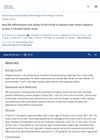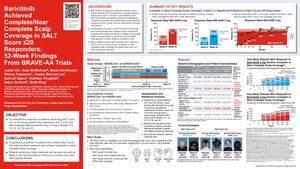TLDR Baricitinib significantly regrows hair in severe alopecia areata patients.
The BRAVE-AA trials demonstrated that baricitinib is effective in treating severe alopecia areata, with a focus on patients achieving a SALT score ≤20. Over 52 weeks, 75% of patients on a 4-mg dose and 71% on a 2-mg dose achieved a SALT score ≤10, indicating significant hair regrowth. Additionally, 62.7% of the 4-mg group and 47.3% of the 2-mg group reached a SALT score ≤5. Patients with less severe baseline disease showed better responses, with improvements noticeable as early as week 8 and increasing with continued treatment.
 1 citations
,
September 2023 in “Dermatology and Therapy”
1 citations
,
September 2023 in “Dermatology and Therapy” Baricitinib helps improve hair growth in severe alopecia, with better results in less severe cases and higher doses working faster.
 1 citations
,
January 2023 in “Przegląd Dermatologiczny”
1 citations
,
January 2023 in “Przegląd Dermatologiczny” The Polish Society of Dermatology recommends treatments for alopecia areata that vary by severity, including topical and systemic medications, with long-term maintenance important for management.
4 citations
,
June 2023 in “Frontiers in immunology” JAK inhibitors help hair regrowth in alopecia areata but have a high risk of side effects.
 2 citations
,
June 2023 in “Indian journal of dermatology, venereology, and leprology”
2 citations
,
June 2023 in “Indian journal of dermatology, venereology, and leprology” Janus kinase inhibitors can regrow hair in alopecia areata but may cause side effects and hair loss may return if treatment stops.
 July 2023 in “IntechOpen eBooks”
July 2023 in “IntechOpen eBooks” New treatments for alopecia areata show promise, but more research is needed to confirm their effectiveness.
 September 2024 in “Journal of the European Academy of Dermatology and Venereology”
September 2024 in “Journal of the European Academy of Dermatology and Venereology” Baricitinib effectively reduces hair loss in severe alopecia areata with mild side effects.






